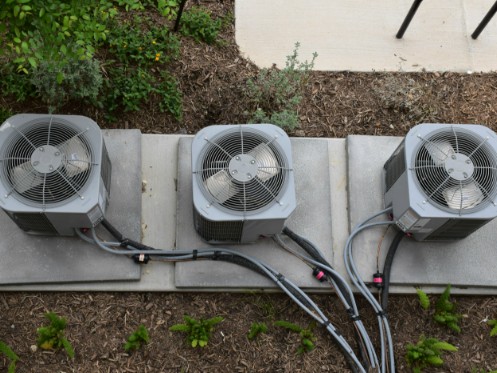It is common for your HVAC unit to make a gentle humming sound when operating. You may also note a clicking noise immediately after the system starts or shuts down. These sounds are not a source of concern. However, sometimes, you can notice distinct sounds from your HVAC unit that are disturbing and worrying. These could indicate signs of an underlying issue within your unit.
1. Loud Banging
Banging noises could be due to ignition problems in your heating unit. Usually, when the thermostat signals the system to begin a new heating cycle, the valve opens and releases the fuel into the combustion chambers. However, due to ignition problems, the released fuel may fail to ignite immediately and accumulate in the chamber. When it finally ignites, the fuel burns, suddenly creating the sound of an explosion.
The banging sound may also be in the HVAC air ducts. Ducts expand when exposed to hot air and contract when cold air flows through them. It may also be due to pressure changes in the ducts. The changes produce a banging noise, which is usually in quick, short bursts. Often, you will hear this noise immediately after turning the heating or cooling system on.
2. Rattling Noises
Over time, the components within your HVAC unit can come loose or broken. Your HVAC air compressor is responsible for pressurizing and moving the refrigerant through your home to keep it cool. If there are faults in this component, your unit may make a rattling sound. This may be accompanied by the failure of your unit to cool your home correctly.
A worn-out motor can also cause a rattling sound. It may be a result of broken bearings or poor lubrication. The friction between metallic parts may cause the sound. A professional fixing the bearings and lubricating moving parts will stop the noise.
The screws that keep the panels and other parts in place can also be loose and fall out, and when the unit is in operation, they may rub against other components and cause rattling sounds. Though they don’t cause immediate risks, it is better to fix them to stop the noise and prevent potential issues within the system.
3. Screeching Sounds
You may hear noises like metal dragging on metal within your HVAC system. This unpleasant sound is often due to a loose blower fan or misaligned fan blades. The screeching sound is produced when the fan blades pull across the furnace casing. Waiting too long to fix the problem can damage internal components. Damaged bearings in the motor fan can also cause a screeching sound. When you hear this sound, turn off the affected unit and seek the help of a technician.
4. Popping Sounds
Sometimes, a popping sound is not a severe issue. However, if it is constant and is accompanied by poor performance of your system, then you should consider professional services. A popping sound may be due to ice accumulation in your unit. It can form when you set the temperature too low or if the system is not draining correctly. The HVAC unit will mostly turn off when there is ice forming so it can thaw out. The ice may fall and crack, and you may notice the sound as it echoes in your system.
If water gets into sensitive parts, such as the compressor terminals, the HVAC unit may also make popping sounds. If the sounds start after heavy rainfall, your unit may have water. Inspect the outdoor units and remove blockages preventing water from flowing out. If the problem persists, contact professionals, and do not try to open the unit.
5. Scratching Sounds
You may hear what sounds like something or someone scratching against the duct walls. There is a high chance that pests like rodents or your pets have found a way into the ductwork. Take action immediately; these animals can make nests within the system and compromise indoor air quality. They may also damage delicate parts by making holes. Regular maintenance can help clean the ducts to remove nests and seal entry points.
6. Rumbling Sounds
If your HVAC unit still emits a rumbling sound long after it should have gone silent, it is a sign of an underlying issue. It may be because the fuel remains in your heater’s combustion chamber even after the system has completed the cycle. The fuel can continue burning and can lead to the release of carbon monoxide into your home. This is a toxic, colorless, odorless gas, and it is hard to identify its presence without detectors. Contacting professional help will not only reduce the noise but also ensure the safety of your family members.
The rumbling sound may also be due to impurities in the fuel. A change in the pilot light color may accompany the rumbling sound. Usually, the pilot light in your heating system burns continually in a blue color. If it is burning in a yellow, red or green color, turn off the system and schedule maintenance services to solve the problem.
7. High-Pitched Whistling Noises
The whistle in the HVAC unit may sound like a human making the noise. Whistling sounds indicate a blockage that’s disrupting airflow. It could be in the air filters, air vents or ductwork. Other times, the problem may be due to an oversized HVAC unit. It will produce whistling as it tries to force air through the ductwork.
8. Shaking Sounds
The air ducts can emit vibrating or shaking sounds. This happens due to the obstruction of return air by blocked air filters. The air filters trap dirt, pet dander and other air pollutants from the air flowing into your HVAC unit. When the air cannot course, the duct pressure falls and causes them to shake or vibrate. Regularly checking the condition of the air filters can help prevent this noise. Most air filter manufacturers recommend changing the air filters every three months.
9. Loud Humming
Most HVAC units emit a low hum when they start, and it is often nothing to worry about. Newer systems have an extra hum when compared to older ones. However, if it is loud, it may be due to a defective contactor relay switch in the air conditioning unit. This is the part responsible for starting the outdoor condenser unit when the thermostat signals a cycle to begin. In heating systems, a problem in the inducer motor can produce noise throughout its operation. The volume of the hum and the period when it occurs can help you decide if it is typical or due to an underlying issue.
When there is one or several of the above noises, trust the services of the reliable, professional HVAC experts at Sheldon's Heating, Air Conditioning & Plumbing to help solve the issue and prevent further system damage. Contact Sheldon's Heating, Air Conditioning & Plumbing today, and we will ensure your home in Riverside, CA is comfortable all year-round. We perform not only heating and cooling services but also plumbing work and services for commercial properties.




